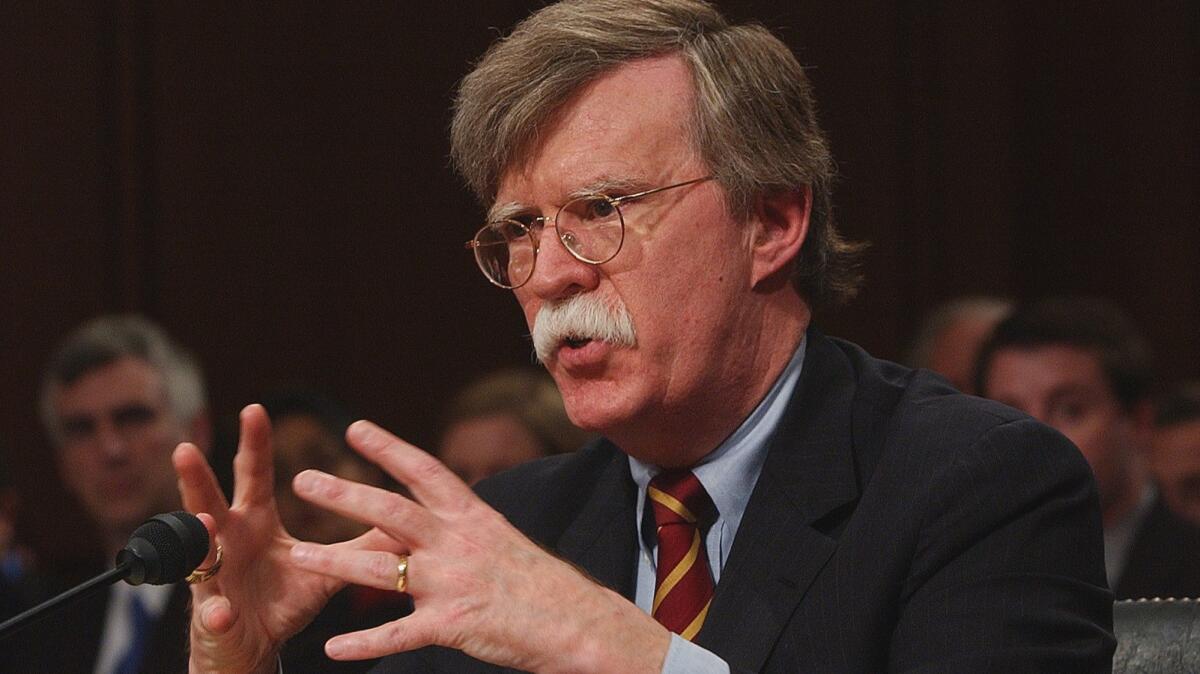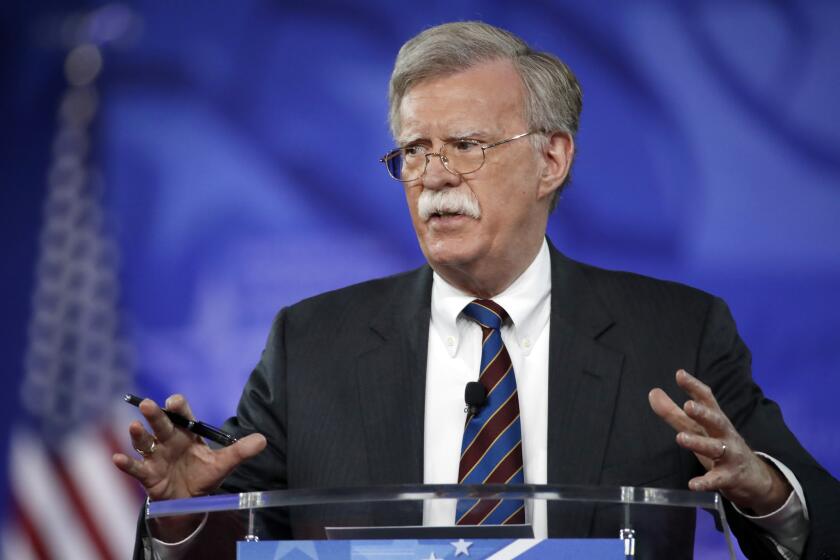Federal judge says John Bolton can publish memoir Trump administration tried to block

- Share via
WASHINGTON — A federal judge ruled Saturday that former national security advisor John Bolton can move forward in publishing his tell-all book despite efforts by the Trump administration to block the release because of concerns that classified information could be exposed.
The decision from U.S. District Judge Royce Lamberth is a victory for Bolton in a court case that involved core 1st Amendment and national security issues. But the judge also made clear his concerns that Bolton had “gambled with the national security of the United States” by opting out of a prepublication review process meant to prevent government officials from spilling classified secrets in memoirs they publish.
Former national security advisor John Bolton skewers President Trump and White House insiders in ‘The Room Where it Happened.’
The White House signaled the legal fight would continue, saying it would try to prevent Bolton from profiting off the book.
President Trump tweeted that Bolton “broke the law by releasing Classified Information (in massive amounts). He must pay a very big price for this, as others have before him. This should never to happen again!!!”
In the meantime, though, the ruling clears the path for a broader election-year readership and distribution of a memoir, due out Tuesday, that paints an unflattering portrait of Trump’s foreign policy decision making during the turbulent year and a half that Bolton spent in the White House.
Bolton’s lawyer, Chuck Cooper, applauded Lamberth for denying the government’s attempt to “suppress” the book. Publisher Simon & Schuster said the decision “vindicated the strong First Amendment protections against censorship and prior restraint of publication.’’
While declining to halt the book’s release, Lamberth did suggest that Bolton may have left himself open to potential criminal prosecution by publishing classified information and that the government could prevent Bolton from benefiting financially.
The White House confirmed in a statement that the government “intends to hold Bolton to the further requirements of his agreements and to ensure that he receives no profits from his shameful decision to place his desire for money and attention ahead of his obligations to protect national security.”
Bolton’s team insisted that he had spent months addressing White House concerns about classified information and that Bolton had been assured in late April by the official he was working with that the manuscript no longer contained any such material. Bolton’s lawyers said the Trump administration’s efforts to block the book were a pretext to censor him for an account that the White House found unfavorable.
The Justice Department sued this past week to block the book’s release and demand that copies be retrieved. Officials submitted written statements from administration officials asserting that the book contained classified information. They also said Bolton had failed to complete a prepublication review process meant to prevent government officials from disclosing national security secrets in books.
The judge did not take issue with those concerns in his 10-page order. But with more than 200,000 copies of the book already distributed to booksellers across the country, attempting to block its release would be futile, Lamberth wrote. Major media organizations also obtained copies of the book and have published comprehensive accounts about it.
“In taking it upon himself to publish his book without securing final approval from national intelligence authorities, Bolton may indeed have caused the country irreparable harm. But in the Internet age, even a handful of copies in circulation could irrevocably destroy confidentiality,” Lamberth wrote.
“With hundreds of thousands of copies around the globe — many in newsrooms — the damage is done. There is no restoring the status quo,” the judge wrote.
“The Room Where it Happened: A White House Memoir” depicts a president whose foreign policy objectives were directly linked to his own political gain.
Bolton says Trump “pleaded” with China’s Xi Jinping during a 2019 summit to help Trump’s reelection prospects. Bolton writes that Trump linked the supply of military assistance to Ukraine to that country’s willingness to conduct investigations into former Vice President Joe Biden and his son Hunter — allegations that were at the heart of an impeachment trial that ended with Trump’s acquittal by the Senate in February.
The months-long classification review process for the manuscript took a complex path.
Bolton says he was told on April 27 by a career official with whom he had worked for months on edits that the manuscript was now free of classified information. But another White House official soon afterward began an additional review and identified material that he said was classified, prompting the administration to warn Bolton in writing against publication.
Bolton’s lawyers say the White House assertions of classified material were an attempt to censor him over a book the administration simply finds unflattering.
“If the First Amendment stands for anything, it is that the Government does not have the power to clasp its hand over the mouth of a citizen attempting to speak on a matter of great public import,” Bolton’s attorneys wrote in a court filing.
Trump on Thursday called the book a “compilation of lies and made up stories” intended to make him look bad. He tweeted that Bolton was just trying to get even for being fired “like the sick puppy he is!”
Even Democrats who pounced on some of Bolton’s anecdotes to condemn the president expressed frustration that he had saved them for his book instead of participating in the impeachment case.
More to Read
Get the L.A. Times Politics newsletter
Deeply reported insights into legislation, politics and policy from Sacramento, Washington and beyond. In your inbox three times per week.
You may occasionally receive promotional content from the Los Angeles Times.










